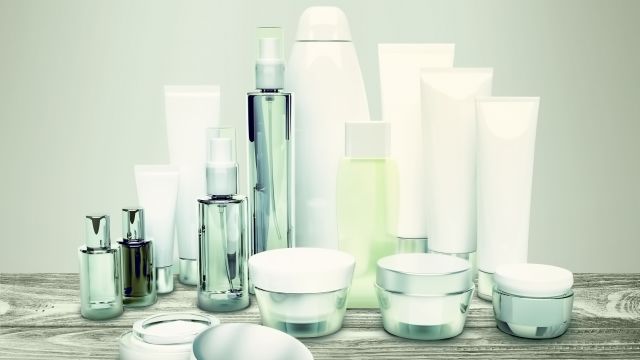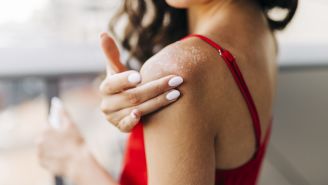"The most important defense against aging skin is using sunscreen daily," says Gary Marder, a cosmetic dermatologist based in Port St. Lucie and Okeechobee, Florida. "Sunscreen helps preserve your skin, cutting down on wrinkles that will form down the road." Choose sunscreen that has broad spectrum protection (both UVA and UVB) with an SPF of at least 15, preferably 30. For maximum protection, look for a product that contains zinc oxide. Here are six more anti-aging skin product ingredients that are scientifically proven to work:
- Retinol: Retinol is a form of vitamin A that speeds up cell turnover, sweeps away the dead cells that cause dullness, and boosts collagen and elastin by stimulating cellular repair at the deepest level of the skin. The result is a smoother-looking complexion. Retinol also pumps up circulation by increasing blood-vessel formation, so skin looks healthier. You can buy products that containing retinol over the counter in mild, but effective, formulations. Retin-A, available from your dermatologist, is a stronger, prescription retinol product.
- Alpha-Hydroxy Acids (AHAs): AHAs (glycolic, lactic, tartaric, and citric acids) remove dead and damaged cells, helping to reduce fine lines, age spots, acne scars, and discoloration. Glycolic acid was the original AHA and remains popular. In low concentrations (less than 3 percent) alpha-hydroxy acids work as water-binding agents. The most effective and well-researched AHAs are glycolic acid and lactic acid, both available in over-the-counter and prescription-strength products.
- Hyaluronic Acid: "Hyaluronic acid has been around for years, but has only recently been used in cosmetics," Marder says. "The beauty of hyaluronic acid is that it absorbs water and plumps up your skin." Using moisturizers that contain hyaluronic acid helps your skin repair and regenerate itself after suffering from dryness, environmental stresses, or irritation. While moisturizers, eye creams, and other skin products that contain hyaluronic acid tend to be a bit pricey, they can offer you a step up from your usual moisturizer.
- Hydroquinone: To help even out sun spots, blotches, and mottled skin, a little hydroquinone can work wonders. "It's the old standard of bleaching creams," Marder explains. It works by blocking the enzyme that triggers melanin production in the skin. The over-the-counter version contains 2 percent hydroquinone; the prescription version contains 4 percent. While hydroquinone is approved by the FDA, some questions have been raised about its safety. If you have concerns, opt for alternative skin-brightening products, such as those containing kojic acid or other non-hydroquinone skin-lighteners prescribed by your dermatologist, which can also help reduce hyperpigmentation if used regularly with daily sunscreen.
- Antioxidants: There are many different types of antioxidants, which are substances found in nature. Many vitamins, such as A, C, and E, have antioxidant properties. Antioxidants can penetrate the skin, turning harmful free radicals—molecules that form in the body when you're exposed to UV rays and other environmental damage—into harmless compounds, thereby stopping them from destroying DNA, elastin, and collagen. Some antioxidants also help stimulate collagen, boost cell repair, and fade blotches.
- Peptides: Peptides (or copper peptides), available for about 15 years, have been referred to as the most effective skin regeneration product. Studies have shown that these small proteins stimulate collagen and elastin production, and also act as antioxidants. Copper is a trace element found in every cell. In skin care products, they combine to enhance healing. You can find effective, relatively affordable serums, creams, and SPF moisturizers containing peptides in the skin care aisle of your local drugstore, next to other anti-aging products.






